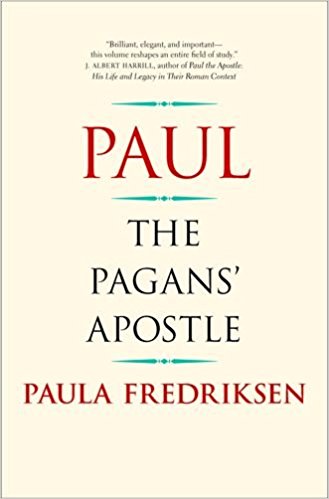As Fredricksen says, Abraham was seen as the true convert to Biblical religion by both Philo and later the rabbis (p. 105). And indeed he was since previously he had worshipped the gods of Ur. Conversion amounted to leaving those idols behind. It can be no accident then that Paul sees Abraham as the prototypical model of what his own converts have done— trusted the genuine God and it being counted as righteousness (Gal.3 and Rom. 4). But if Abraham is a genuine convert, so are the Jews like Paul and the Gentiles he converted as well. When one begins to believe that Jesus is the risen Lord, and part of the divine identity (see Phil. 2.5-11) one is not simply ‘turning’ to early Jewish religion, one is turning to its radical eschatological form that is Christ centered. And as my old mentor C.K. Barrett once said, if Paul himself is not an example of a convert, one would be hard-pressed to find any such examples in antiquity.
Paul had a new view of God, a new view of covenants, a new view of the eschatological situation since the Christ event, a new view of sacrifice and what religious praxis should look like, and none of the reaffirmations he makes about the continuity between God’s previous work with his people and what God in Christ was currently doing should be used to damp down the apocalyptic newness of Paul’s message and belief system and praxis. Turning may be the language, but conversion to a truly new form of Biblical faith is the message.
The attempt to tame Paul, and make him still fit into early Jewish shoes of an ordinary sort only with a Messianic logo on them rather than a Nike swoosh, was rightly warned against by both A. Segal an D. Boyarin. Paul was indeed a radical Jew, one who would not and will not be neatly fit even into the surprising diversity of early Judaism as it existed before Christ. He believed of course that the Hebrew Bible was the Word of God, that Jesus was both the Jewish messiah and the savior of Gentiles, he believed the Scriptures were being fulfilled and the eschatological dreams of Isaiah and others were coming to pass.
He also believed that God had given Israel covenants plural (Rom. 9.1-5) not just a single covenant renewed again and again. He saw the new covenant as the fulfillment of the Abrahamic covenant, and the Mosaic covenant as a temporary covenant meant to keep God’s people in line until the Messiah came (Gal. 4.1ff). This was not the view of all the earliest Jewish followers of Christ, as the example of the circumcision party makes clear, but it was certainly Paul’s view. If neither circumcision nor uncircumcision counts but rather only new creation, if it is true of anyone who is in Christ, Jew or Gentile, that they are new creation, then Paul is not merely saying in 1 Cor. 7 circumcision doesn’t matter for Gentile converts to Christ. No, he is saying since there is a new covenant which does not require that of anyone, it simply doesn’t matter in light of the new eschatological situation. The Mosaic covenant has had its day, and is fading into obsolescence in light of the new covenant and the glory of Christ. Paul’s mission was not law or commandment free, it was Mosaic covenant free. There were still commandments aplenty in the new covenant, some of which derived from the previous contract/covenant.












